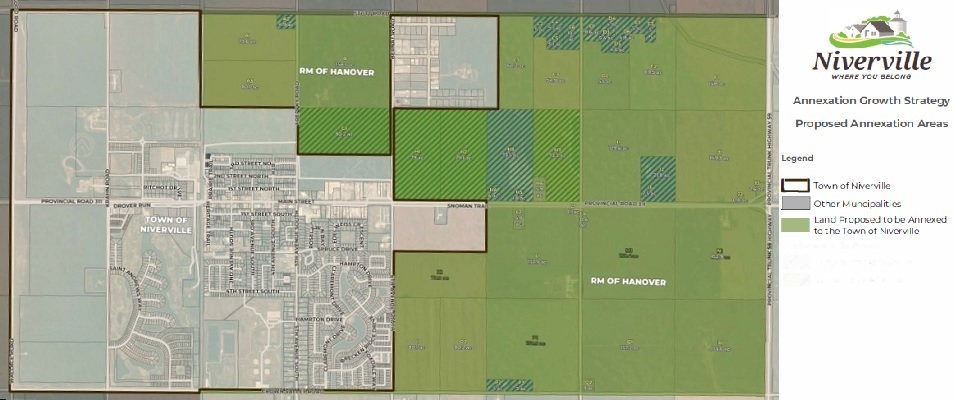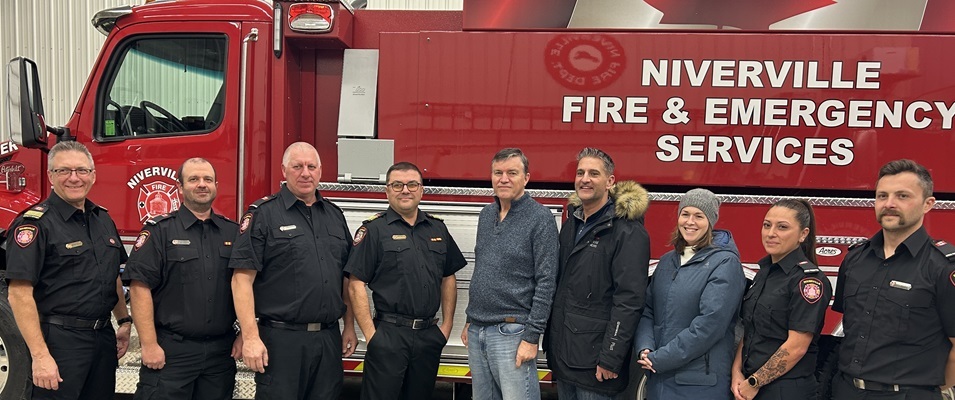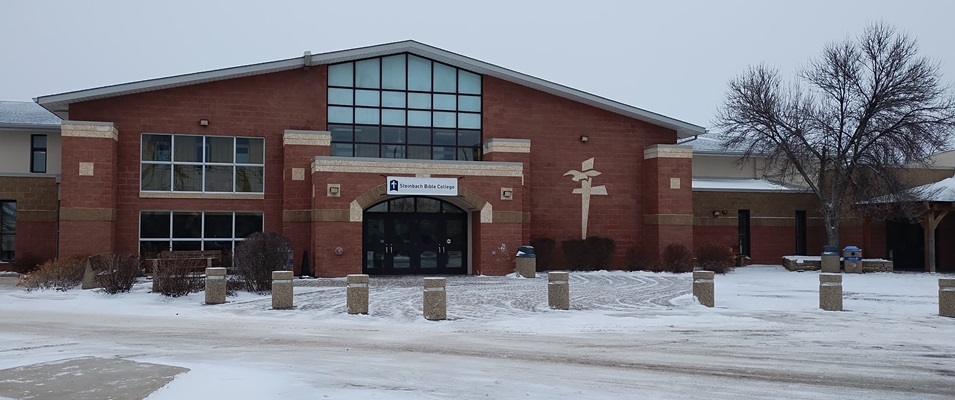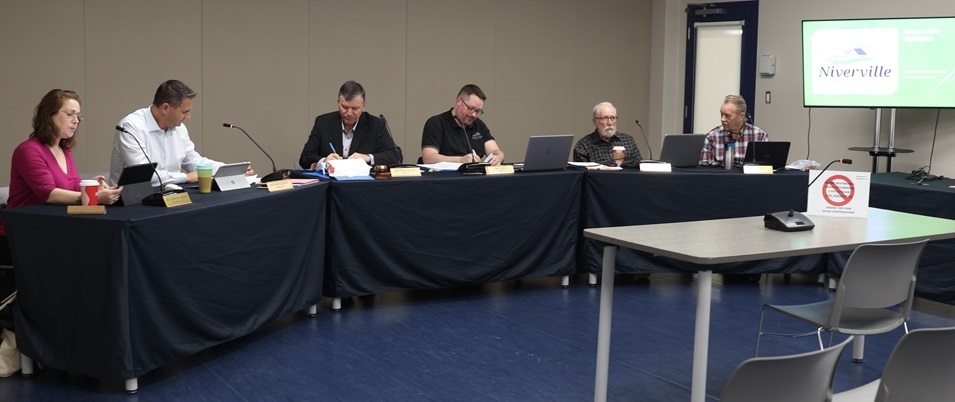
It’s been almost a year since Niverville’s council went public with their intent to double the community’s land base by annexing almost 2,600 acres from the neighbouring RM of Hanover.
The area in question includes a swath of property on both sides of the two-mile stretch of Highway 311 from Niverville to Highway 59.
Since open houses were held last December, a lot has happened at both the local and municipal levels. This week, council received important feedback from the Manitoba Municipal Board (MMB), in whose hands the final decision rests.
According to Niverville mayor Myron Dyck, the MMB has decided to take the matter to a public hearing to allow the affected landowners a chance to voice their opinions. Hearing these concerns will provide more clarity in terms of the government agencies that need to get involved in the process.
“The letter said that there were questions and some concerns noted by a few [government] departments: agriculture, infrastructure, and community planning,” Dyck says. “In order to hear these concerns formally, the Municipal Board has said they wish to hold a public hearing.”
Dyck is not surprised at this turn of events. It’s the job of the Department of Agriculture to protect rural land for ag purposes, he says, and they are in the habit of objecting to every annexation proposal in the beginning stages.
“Annexations still happen, but they would not be doing their job if they didn’t raise concerns any time land use changes from ag to other,” Dyck says. “It’s important to note here that the land [we’re asking to annex] can be farmed forever and will only change if a landowner or ag producer sells to a developer. The landowner controls this, not the Town of Niverville.”
He adds, though, that once ag land changes to commercial or residential zoning, it can’t go back to ag again under current municipal law.
Government Stakeholders
As for Manitoba Transportation and Infrastructure’s (MTI) stake in this process, Dyck says that adequate highway access, service roads, and intersection improvements will need to be considered for the immediate and distant future.
It’s conceivable to anticipate that the commercial corridor proposed by Niverville’s council may be the impetus needed to finally see action on long-awaited improvements.
“What will be interesting here is to see if they have anything to say about a Highway 59 twinning,” Dyck says. “They said, they have a plan and perhaps this hearing will have them say what they are planning.”
In terms of the community planning division of the government, Dyck says their interests will lie in seeking clarification on what is being proposed for future residential and commercial development.
Again, only time will tell what happens next. It’s the landowners west of Niverville that hold all the cards in this situation.
Landowner Stakeholders
In 2022, Niverville’s council contracted the community planning firm Urban Systems to perform initial research and meet with the 45 landowners in the proposed annexation area. Their goal was to mitigate concerns before presenting the proposal to the province.
It was important, at the time, to make clear the distinction between annexation and expropriation.
Annexation involves a basic land transfer, meaning that newly acquired land would fall under the umbrella of the new jurisdiction. In this case, the affected landowners would answer to and pay taxes to the Town of Niverville instead of the RM of Hanover.
The short-term result is a change in taxation, which Niverville’s council hopes to make appealing by offering a plan to offset the additional tax load. In turn, the landowners would benefit from the services that Niverville provides in terms of road maintenance, garbage and recycling collection, and sewer and water hookups.
Each of the landowner stakeholders was provided with the option to object to the annexation proposal via the MMB. According to the MMB’s procedures manual, if 25 or more stakeholders object to the proposal, a public hearing could be called.
Even so, Dyck says that Niverville’s council hoped for a public hearing anyway.
“As mayor and our council, we had requested a hearing so as to be transparent and allow all concerned to have their questions and concerns noted by the Municipal Board [so it could be] considered in their final decision.”
Dyck wouldn’t be surprised to learn that some objections from the affected landowners have been raised.
“This constitutes a potential change,” says Dyck. “Change in whom they would pay tax to, concern about how their land may be affected, and what bylaws they would be subject to now. Change often causes uncertainty that can lead to fear and even anger, thus leading one to want to object. It’s a very common response to change of any kind.”
Why the Annexation Is Important
There are relatively high stakes in this game for both the Town of Niverville and the RM of Hanover.
For Niverville’s council, it’s about long-term planning for continued growth. In the past 25 years, the community has experienced a whopping 343 percent increase in population.
Should this growth continue, planners at Urban Systems estimate that Niverville’s population in 25 years will reach 30,000 under moderate growth conditions, and 40,000 if the currently high growth rate doesn’t taper off.
Regardless of the magnitude of the growth rate, the Town of Niverville is expected to exhaust its current supply of developable land within the next 15 to 20 years.
The ramifications for annexation are also significant for the RM of Hanover.
Hanover reeve Jim Funk says that the economic benefit to creating a commercial corridor that borders his RM cannot be overlooked. And with Niverville being the closest urban centre, delivering services to this corridor is much more feasible under the town’s governance.
Even so, he adds that the RM of Hanover is fully prepared to work out a cost-share deal with Niverville to make those services happen.
“We’re just trying to work together with Niverville so that we can both benefit out of this deal,” Funk says.
Government processes aside, Urban System’s Jeff Palmer says that a significant commercial corridor with access from major highways has the potential to provide huge benefits to residents of the whole region.
“We’re trying to diversify the land uses in Niverville and encourage more commercial and industrial development in order to offer jobs within the community,” says Palmer. “There’s a lot of people that live in Niverville [and its surrounding area] that go elsewhere to work. It’s important that there be jobs in the community that people live in.”
The Proposed Public Hearing
According to Dyck, no date or location has been provided for the impending public hearing. He expects that all stakeholders will receive notices directly from the MMB.
The hearing will be officiated by representatives of the MMB along with representation by some of the governmental department heads, who will be there to hear and help field questions and concerns.
Members of the Niverville and Hanover councils will also be present along with team members from Urban Systems.
“They do not render a decision that night but instead compile a report and present it to the Minister of Municipal Affairs,” says Dyck. “They then must sign off on the report for it to become official.”
At this stage, the MMB will have final authority to deny the annexation request or approve it, either as it’s presented or under specified conditions.



















